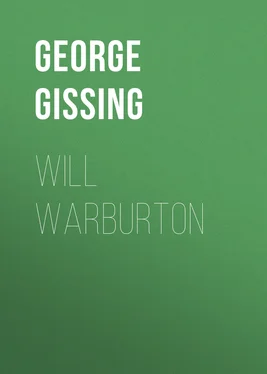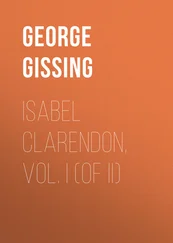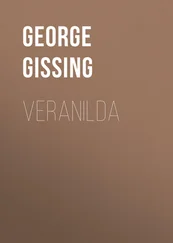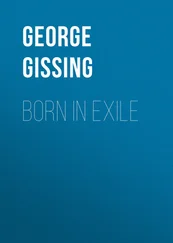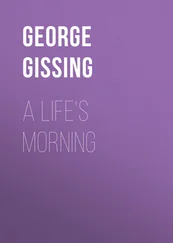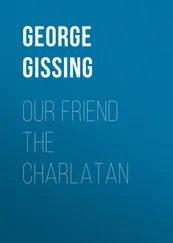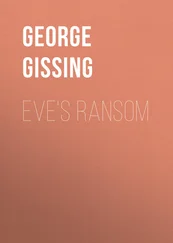George Gissing - Will Warburton
Здесь есть возможность читать онлайн «George Gissing - Will Warburton» — ознакомительный отрывок электронной книги совершенно бесплатно, а после прочтения отрывка купить полную версию. В некоторых случаях можно слушать аудио, скачать через торрент в формате fb2 и присутствует краткое содержание. Жанр: foreign_prose, literature_19, foreign_antique, на английском языке. Описание произведения, (предисловие) а так же отзывы посетителей доступны на портале библиотеки ЛибКат.
- Название:Will Warburton
- Автор:
- Жанр:
- Год:неизвестен
- ISBN:нет данных
- Рейтинг книги:4 / 5. Голосов: 1
-
Избранное:Добавить в избранное
- Отзывы:
-
Ваша оценка:
- 80
- 1
- 2
- 3
- 4
- 5
Will Warburton: краткое содержание, описание и аннотация
Предлагаем к чтению аннотацию, описание, краткое содержание или предисловие (зависит от того, что написал сам автор книги «Will Warburton»). Если вы не нашли необходимую информацию о книге — напишите в комментариях, мы постараемся отыскать её.
Will Warburton — читать онлайн ознакомительный отрывок
Ниже представлен текст книги, разбитый по страницам. Система сохранения места последней прочитанной страницы, позволяет с удобством читать онлайн бесплатно книгу «Will Warburton», без необходимости каждый раз заново искать на чём Вы остановились. Поставьте закладку, и сможете в любой момент перейти на страницу, на которой закончили чтение.
Интервал:
Закладка:
"I'm afraid he's worried about her ," said the landlady, when she had lit the gas, and stood with Warburton surveying the picture. "He can't find a model good-looking enough. I say to Mr. Franks why not make it the portrait of his own young lady? I'm sure she's good-looking enough for anything and—"
Whilst speaking, the woman had turned to look at a picture on the wall. Words died upon her lips; consternation appeared in her face; she stood with finger extended. Warburton, glancing where he was accustomed to see the portrait of Rosamund Elvan, also felt a shock. For, instead of the face which should have smiled upon him, he saw an ugly hole in the picture, the canvas having been violently cut, or rent with a blow.
"Hallo! What the deuce has he been doing?"
"Well, I never!" exclaimed the landlady. "It must be himself that's done it! What does that mean now, I wonder?"
Warburton was very uneasy. He no longer doubted that Franks had purposely avoided him this afternoon.
"I daresay," he added, with a pretence of carelessness, "the portrait had begun to vex him. He's often spoken of it discontentedly, and talked of painting another. It wasn't very good."
Accepting, or seeming to accept this explanation, the landlady withdrew, and Will paced thoughtfully about the floor. He was back in Switzerland, in the valley which rises to the glacier of Trient. Before him rambled Ralph Pomfret and his wife; at his side was Rosamund Elvan, who listened with a flattering air of interest to all he said, but herself spoke seldom, and seemed, for the most part, preoccupied with some anxiety. He spoke of Norbert Franks; Miss Elvan replied mechanically, and at once made a remark about the landscape. At the time, he had thought little of this; now it revived in his memory, and disturbed him.
An hour passed. His patience was nearly at an end. He waited another ten minutes, then left the room, called to the landlady that he was going, and let himself out.
Scarcely had he walked half a dozen yards, when he stood face to face with Franks.
"Ah! Here you are! I waited as long as I could—"
"I'll walk with you," said the artist, turning on his heels.
He had shaken hands but limply. His look avoided Warburton's. His speech was flat, wearied.
"What's wrong, Franks?"
"As you've been in the studio, I daresay you know."
"I saw something that surprised me."
" Did it surprise you?" asked Norbert, in a half-sullen undertone.
"What do you mean by that?" said Will with subdued resentment.
The rain had ceased; a high wind buffeted them as they went along the almost deserted street. The necessity of clutching at his hat might have explained Norbert's silence for a moment; but he strode on without speaking.
"Of course, if you don't care to talk about it," said Will, stopping short.
"I've been walking about all day," Franks replied; "and I've got hell inside me; I'd rather not have met you to-night, that's the truth. But I can't let you go without asking a plain question. Did it surprise you to see that portrait smashed?"
"Very much. What do you hint at?"
"I had a letter this morning from Rosamund, saying she couldn't marry me, and that all must be over between us. Does that surprise you?"
"Yes, it does. Such a possibility had never entered my mind."
Franks checked his step, just where the wind roared at an unprotected corner.
"I've no choice but to believe you," he said, irritably. "And no doubt I'm making a fool of myself. That's why I shot out of your way this afternoon—I wanted to wait till I got calmer. Let's say good-night."
"You're tired out," said Warburton. "Don't go any farther this way, but let me walk back with you—I won't go in. I can't leave you in this state of mind. Of course I begin to see what you mean, and a wilder idea never got into any man's head. Whatever the explanation of what has happened, I have nothing to do with it."
"You say so, and I believe you."
"Which means, that you don't. I shan't cut up rough; you're not yourself, and I can make all allowances. Think over what I've said, and come and have another talk. Not to-morrow; I have to go down to St. Neots. But the day after, in the evening."
"Very well. Good-night."
This time they did not shake hands. Franks turned abruptly, with a wave of the arm, and walked off unsteadily, like a man in liquor. Observing this, Warburton said to himself that not improbably the artist had been trying to drown his misery, which might account for his strange delusion. Yet this explanation did not put Will's mind at ease. Gloomily he made his way homeward through the roaring night.
CHAPTER 9
Ten o'clock next morning saw him alighting from the train at St. Neots. A conveyance for which he had telegraphed awaited him at the station; its driver, a young man of his own age (they had known each other from boyhood), grinned his broadest as he ran toward Will on the platform, and relieved him of his bag.
"Well, Sam, how goes it? Everybody flourishing?—Drive first to Mr. Turnbull's office."
Mr. Turnbull was a grey-headed man of threescore, much troubled with lumbago, which made him stoop as he walked. He had a visage of extraordinary solemnity, and seemed to regard every one, no matter how prosperous or cheerful, with anxious commiseration. At the sight of Will, he endeavoured to smile, and his handshake, though the flabbiest possible, was meant for a cordial response to the young man's heartiness.
"I'm on my way to The Haws, Mr. Turnbull, and wanted to ask if you could come up and see us this evening?"
"Oh, with pleasure," answered the lawyer, his tone that of one invited to a funeral. "You may count on me."
"We're winding up at Sherwood's. I don't mean in bankruptcy; but that wouldn't be far off if we kept going."
"Ah! I can well understand that," said Mr. Turnbull, with a gleam of satisfaction. Though a thoroughly kind man, it always brightened him to hear of misfortune, especially when he had himself foretold it; and he had always taken the darkest view of Will's prospects in Little Ailie Street.
"I have a project I should like to talk over with you—"
"Ah?" said the lawyer anxiously.
"As it concerns my mother and Jane—"
"Ah?" said Mr. Turnbull, with profound despondency.
"Then we shall expect you.—Will it rain, do you think?"
"I fear so. The glass is very low indeed. It wouldn't surprise me if we had rain through the whole month of August."
"Good Heavens! I hope not," replied Will laughing.
He drove out of the town again, in a different direction, for about a mile. On rising ground, overlooking the green valley of the Ouse, stood a small, plain, solidly-built house, sheltered on the cold side by a row of fine hawthorns, nearly as high as the top of its chimneys. In front, bordered along the road by hollies as impenetrable as a stone wall, lay a bright little flower garden. The Haws, originally built for the bailiff of an estate, long since broken up, was nearly a century old. Here Will's father was born, and here, after many wanderings, he had spent the greater part of his married life.
"Sam," said Will, as they drew up at the gate, "I don't think I shall pay for this drive. You're much richer than I am."
"Very good, sir," was the chuckling reply, for Sam knew he always had to expect a joke of this kind from young Mr. Warburton. "As you please, sir."
"You couldn't lend me half-a-crown, Sam?"
"I daresay I could, sir, if you really wanted it."
"Do then."
Will pocketed the half-crown, jumped off the trap, and took his bag.
"After all, Sam, perhaps I'd better pay. Your wife might grumble. Here you are."
He handed two shillings and sixpence in small change, which Sam took and examined with a grin of puzzlement.
Читать дальшеИнтервал:
Закладка:
Похожие книги на «Will Warburton»
Представляем Вашему вниманию похожие книги на «Will Warburton» списком для выбора. Мы отобрали схожую по названию и смыслу литературу в надежде предоставить читателям больше вариантов отыскать новые, интересные, ещё непрочитанные произведения.
Обсуждение, отзывы о книге «Will Warburton» и просто собственные мнения читателей. Оставьте ваши комментарии, напишите, что Вы думаете о произведении, его смысле или главных героях. Укажите что конкретно понравилось, а что нет, и почему Вы так считаете.
